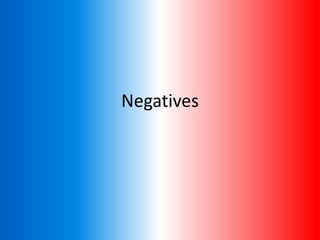
Negatives
- 1. Negatives
- 2. Ne...pas This is the most commonly used negative form in French which means “not” in English. The words NE and PAS are sandwiched around the verb. Je ne mange pas du chocolat.
- 3. There are other negative phrases which are also sandwiched around the verb: • Ne...jamais – Never Je ne fumerai jamais. • Ne...rien – Nothing/not anything Mon ami ne mange rien. • Ne...personne – Nobody/not anybody Je ne connais personne ici. • Ne...plus – No longer/not anymore Elle ne visite plus sa tante.
- 4. When using NE + a negative with a noun, replace UN/UNE/DES with DE or D’: Il n’y a pas de cinémas. The second part of a negative noun can be used in short phrases without a verb: Qui est dans la salle de bain? Rien!
- 5. Ne...aucun This means “not a single”. AUCUN has to agree with the adjective that follows it. Aucun – Masculine singular Aucune – Feminine singular Aucuns – Masculine plural Aucunes – Feminine plural Il n’a aucune idée. Elle n’a aucun ami.
- 6. Ne...ni...ni This means “neither...nor...”. NE goes before the verb and the two NIs go twice before the nouns they relate to: Je n’ai ni frère ni sœur.
- 7. Ne...que This is one way to say “only”: Je ne regarde que la télé deux fois par semaine.
- 8. Negatives + perfect tense In the perfect tense, NE or N’ goes before the auxiliary. • PLUS/PAS/JAMAIS/RIEN go before the past participle: Il n’a pas fait ses devoirs. Elle n’a rien mangé. • PERSONNE/QUE/NI...NI/AUCUN go after the past participle: Pendant le weekend, nous n’avons visité que mes grandparents. On n’a vu personne.
- 9. Negative + verb + infinitive NE/N’ goes before the verb and the second part goes before the infinitive: Je n’aime pas jouer le rugby.